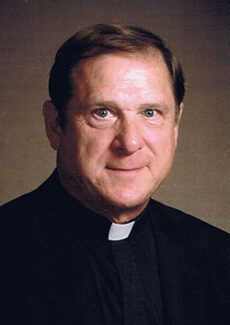To remain true to mission, church must be Body, Blood of Christ for life of world

Father R. Michael Schaab
Living the Word l Father R. Michael Schaab
Solemnity of the Most Holy Body and Blood of Christ (Corpus Christi) l June 11
Deuteronomy 8:2-3,14b-16a; Psalm 147:12-13,14-15,19-20; 1 Corinthians 10:16-17; Sequence: Lauda Sion; John 6:51-58
Today’s readings present an analogy between, on the one hand, how God provided nourishment for the Israelites in the Old Testament on that 40-year journey in the desert known as the Exodus and, on the other hand, how God provides nourishment “for the life of the world” in the New Testament in the form of the Body and Blood of Christ. As one might suspect, there are similarities and differences in this analogy.
There were three forms of nourishment for the Israelites in their desert journey — manna, water from the rock and, thirdly, “every word that comes forth from the mouth of the Lord.” The manna was “a food unknown to your fathers” which reminded the Israelites that the will of God had also been unknown to them.
The Israelites needed the word of God in order to know the mind of God. Today’s Psalm praises God because he gave them “his statutes and his ordinances,” which he had “not done for any other nation.” This third form of nourishment was necessary not simply to sustain physical life. It was required for their spiritual life. While manna and water from the rock sustained the Chosen People on their journey in the desert, the word of God would continue to sustain them as they entered into the Promised Land.
COMING FULL CIRCLE
As recorded in today’s Gospel, the nourishment sent by God in the New Testament is the Body and Blood of Christ, and, once again, there are three experiences of nourishment — “my flesh is true food and my blood is true drink” and, thirdly, once again, God’s word, for this Jesus Christ is the Word of God made flesh. But, while for the Israelites the word of God provided them a share in the mind of God as they wondered through Sinai, for the followers of Jesus, the Word of God in the Body and Blood provides them with an actual share in the very nature of God as they journey through this life and beyond. And it is that sharing in God’s divine nature that enables “whoever eats this bread” to live forever. As Jesus said, “Whoever eats my flesh and drinks my blood has eternal life.”
Beginning with a reflection on how we are being nourished by the Body and Blood, we are called to realize that we really are “one body, for we all partake of the one loaf.” Therefore, the Christian calling is not only to receive the Body and Blood of the Lord, but also to become his body and blood.
So, today’s readings take us full circle. Beginning with a reflection on how we are being nourished by the Body and Blood, we are called to realize that we really are “one body, for we all partake of the one loaf.” Therefore, the Christian calling is not only to receive the Body and Blood of the Lord, but also to become his body and blood. Furthermore, the purpose of the Church, “the one body” of Christ on earth, has to be the same purpose that Jesus himself had when he was on this earth and gave us his Body and Blood.
Jesus said, “The bread that I will give is my flesh for the life of the world.” So, too, in order to remain true to its mission, the Church today must be the Body and Blood of Christ for the life of this world.
—
FATHER R. MICHAEL SCHAAB is a senior priest of the Diocese of Peoria who gives retreats and days of recollection, and who fills in as presider at parish Masses on weekends. He resides on a hobby farm in Putnam County.





